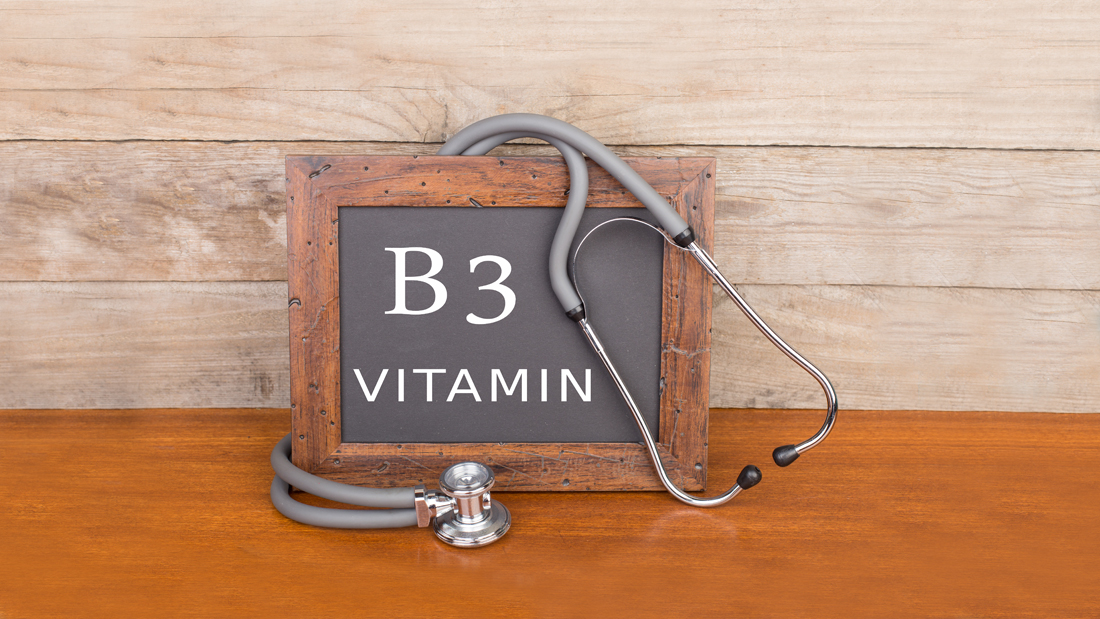Niacin – sources of vitamin B3 in pregnancy
In this article:
- An important study
- Vitamin B3’s role in our diets
- Foods
- Supplements
- Main Points
- References

An important study
In August 2017, a study in the New England Journal of Medicine grabbed headlines as it suggested that extra doses of vitamin B3 (niacin) might help prevent certain birth defects and miscarriages.1
Birth defects and miscarriages are widely thought to affect up to 6% of babies and 20% of all pregnancies so this research might have important implications for millions of women across the world in the future. This vitamin (vitamin B3) may be able to help compensate for defects in the ability of the body to make a molecule, called nicotinamide adenine dinucleotide (NAD), which H Shi and colleagues have found to be linked to healthy foetal development for the first time.
The team, based in Australia found that defects in genes related to the production of NAD lead to birth defects, however giving vitamin B3 to mice with these defects, prevented the complications. This research suggests that vitamin B3 supplements might be used in future for pregnant women at risk of these complications. However, further research is needed in humans before clinical guidelines and doctors advise pregnant women to consume additional vitamin B3. This research has however led to renewed interest from the public as to what are common sources of vitamin B3.
Vitamin B3’s role in our diets
Vitamin B3 (niacin) helps release the energy from foods we consume and keeps the skin healthy. Niacin deficiency can cause Pellagra in adulthood. Pellagra can also be caused by poor diet or by an inability of the body to use the vitamin B3 consumed in the diet. This can occur due to high alcohol intake, some medications and other conditions. This condition can present inflamed skin when exposed to sunlight, diarrhoea, or sores in the mouth.
Eating a well-balanced diet provides the daily recommended levels of niacin. These are 16.5mg per day in men and 13.2mg per day in women. Unless advised and prescribed by your doctor, excess niacin consumption should be avoided as high doses can lead to liver damage. If you have any concerns, consult your primary care physician (GP) or midwife.
Foods
Many foods contain niacin; however it is generally found in the largest amounts in meat, fish, wheat flour, and milk. Turkey has the largest amount of niacin per serving, with one turkey breast containing the daily recommended intake. Other meats such as chicken breast, liver and beef contain substantial amounts of niacin contributing towards your daily intake. Fish, such as tuna, contain as much as 50% of the daily recommended consumption while vegetables such as mushrooms, green peas, avocado, peanuts and sunflower seeds are all good sources of niacin.
Supplements
A healthy, well-balanced diet will provide adequate niacin levels unless your doctor has diagnosed you with a condition associated with niacin deficiency. If you require additional niacin, this can be consumed through supplements, with the guidance from your pharmacist or doctor.
Main Points
• A 2017 study in the New England Journal of Medicine suggested that extra doses of vitamin B3 (niacin) might help prevent certain birth defects and miscarriages.
• Birth defects and miscarriages are thought to affect 6% of babies and 20% of reported pregnancies worldwide
• The research team found that defects in genes related to the production of NAD lead to birth defects
• Giving vitamin B3 to mice with certain genetic defects prevented the birth complications.
• The NAD research suggests that vitamin B3 supplements might be used in future for pregnant women at risk.
• Further research is needed in humans before clinical guidelines and doctors advise pregnant women to consume additional vitamin B3.
• Vitamin B3 (niacin) plays a role in releasing energy from foods we consume and keeps the skin healthy.
• Eating a well-balanced diet provides the daily recommended levels of niacin. These are 16.5mg per day in men and 13.2mg per day in women.
• Unless advised and prescribed by your doctor, excess niacin consumption should be avoided as high doses can lead to liver damage.
• Niacin is generally found in the largest amounts in meat, fish, wheat flour and milk.
• B3 supplements should be avoided unless prescribed by your doctor.
References
- Shi H, Enriquez A, Rapadas M, Martin EMMA, Wang R, Moreau J, et al. NAD Deficiency, Congenital Malformations, and Niacin Supplementation. New England Journal of Medicine. 2017;377(6):544-52.



